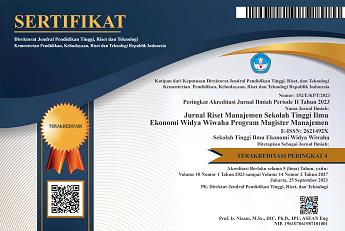ANALISIS FAKTOR-FAKTOR YANG MEMPENGARUHI PENERAPAN AKUNTANSI AKRUAL PADA PEMERINTAH DAERAH KABUPATEN BANTUL
DOI:
https://doi.org/10.32477/jrm.v5i1.44Keywords:
The Readines of human resources, Accrual accounting, Government Regulation No. 71 of 2010, the level of education of financial staff, the experience of running the cash basis toward accrualsAbstract
The purposes of this study are : 1. to analyze the influence between the education level of financial staff on the application of accrual accounting. 2. to analyze the effect of the experience of running the cash basis toward accruals on the accrual accounting application. This research design is quantitative research by using regression test, where the principal data from samples of a population is collected by distributing questionnaire instrument. Hypothesis testing performed by Multiple Linear Regression was used to test the effect between variables of education staff finance level (X1) and experience running cash basis toward Accrual (X2) on Accrual Accounting (Y) application. The results of this study indicate that: a) The level of education of financial staff (X1) has a positive influence on the application of accrual accounting (Y). This is indicated by the results of research showing that staff education level has an explanation power of 59.3%. b) The result of experience analysis running cash basis toward accrual (X2) show value t count equal to 4,744 with sig. 0,000. Therefore the value of sig. less than0.05 then Ho is rejected, which means experience running the cash basis (X2) has a positive effect on the application of accrual accounting (Y).
References
Bastian, Indra (2001), Akuntansi Sektor Publik di Indonesia, cet.1, Yogyakarta: BPFE-Yogyakarta.
Hafiz, Abdul Tanjung (2015), Akuntansi Keuangan Daerah Berbasis Akrual Untuk SKPD, Cetakan pertama, Bandung : Alfabeta
Halim, Abdul (2002), Akuntansi Keuangan Daerah, Edisi Pertama, Jakarta: Salemba Empat.
Halim, Abdul dan M. Syam Kusufi,(2016), Teori, Konsep dan Aplikasi : Akuntansi Sektor Publik, Cetakan kedua, Jakarta: Salemba Empat.
Hetti Herlina (2013), “Analisis Faktor-faktor Yang Mempengaruhi Kesiapan Pemerintahan Daerah Dalam Implementasi PP 71 Tahun 2010”, Skripsi, Universitas Negeri Padang.
Mardiasmo, (2009), Akuntansi Sektor Publik, Edisi ke-4, Yogyakarta: CV Andi.
Nazir, Moh (2014), Metode Penelitian, cet.10, Bogor: Penerbit Ghalia Indonesia
Peraturan Pemerintah No. 71 Tahun (2010), Standar Akuntansi Pemerintahan (Berbasis Akrual), IAI: Komite Standar Akuntansi Pemerintahan.
Peraturan Pemerintah No. 58 Tahun (2005), Pengelolaan Keuangan Daerah.
Peraturan Menteri Dalam Negeri Nomor 13 Tahun (2006), Pedoman Pengelolaan Keuangan Daerah.
Riduwan dan Engkos Achmad Kuncoro (2013), Cara Menggunakan dan Memaknai Path Analysis (Analisis Jalur), cet.4, Bandung: Alfabeta
Sigit, Soehardi (2001), Metodologi Penelitian, cet.2, Yogyakarta: BPFE UST.
Sugiyono, (2014), Metode Penelitian Administrasi dilengkapi Metode R&D, Cetakan ke-22, Bandung: Alfabeta.
Sumarsono, Sony (2003), Ekonomi Manajemen Sumber Daya Manusia dan Ketenagakerjaan, Graha Ilmu Yogyakarta.
Undang-Undang Nomor 12 Tahun (2008), Perubahan Kedua atas Undang- Undang Nomor 32 Tahun 2004 tentang Pemerintah Daerah.
Undang-Undang Republik Indonesia Nomor 23 Tahun (2014), Pemerintahan Daerah.









